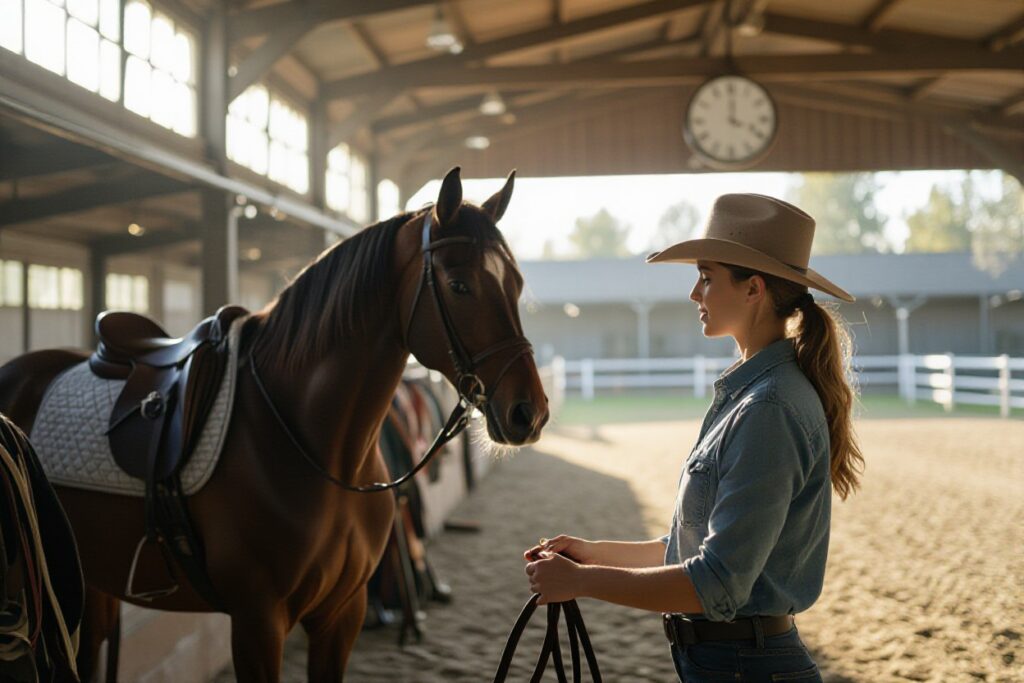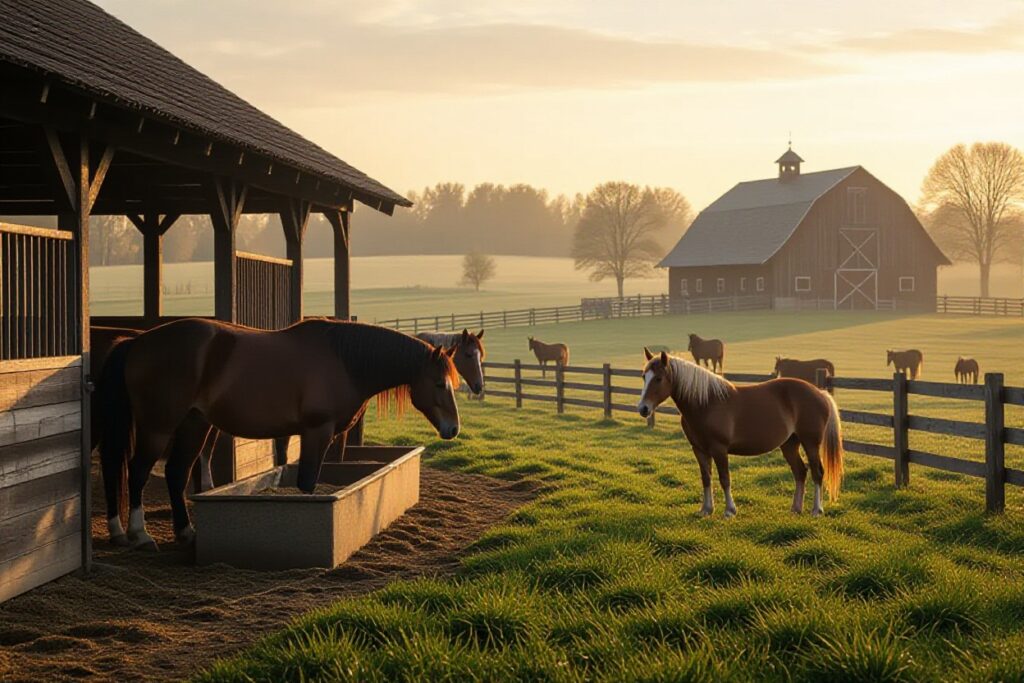Challenges inherent in managing a boarding stable can be daunting, yet rewarding when approached with care and knowledge. As you navigate the daily tasks of overseeing the care of horses, maintaining facilities, and managing relationships with boarders, remember that communication and organization are key. This responsible role requires dedication and a passion for equestrian pursuits, but the connection with these majestic animals and the community you build can be fulfilling.

The Complexities of Boarding Stable Management
Balancing Horse Care and Business Operations
One of the biggest challenges you will face as a boarding stable manager is finding a balance between providing top-notch care for the horses in your care and running a successful business. It can be tempting to focus solely on the business side of things in order to turn a profit, but it’s crucial that you prioritize the health and well-being of the horses above all else. Overlooking the needs of the horses for the sake of profit can have detrimental effects on their health and happiness, ultimately leading to a decline in business as word spreads. It’s important to create a schedule and management system that ensures each horse receives the individualized care and attention they need, while also maintaining efficient business operations.
Managing Staff and Volunteers
The management of staff and volunteers is another aspect of running a boarding stable that can be quite challenging. Having a reliable and skilled team is crucial to the success of your stable, as they are responsible for the day-to-day care of the horses and the smooth operation of the facility. It’s important to provide thorough training and clear expectations for your staff and volunteers, as well as regular supervision and feedback to ensure they are performing their duties effectively.
Another important factor to consider when managing staff and volunteers is communication. Effective communication is key to avoiding misunderstandings and ensuring that everyone is on the same page when it comes to the care of the horses and the overall operation of the stable. Regular team meetings, training sessions, and open lines of communication can help foster a positive and productive working environment.
Financial Challenges
Assuming the role of managing a boarding stable comes with various financial challenges that require careful planning and organization. From budgeting for hay, grain, and veterinary care to managing client payments and invoices, you will need to stay on top of your finances to ensure the smooth operation of your stable.
Budgeting for Hay, Grain, and Veterinary Care
One of the key financial challenges you will face is budgeting for necessary supplies such as hay, grain, and veterinary care. It’s crucial to manage your expenses carefully to make sure you can provide the best care for the horses while staying within your budget constraints. Keeping track of prices, evaluating different suppliers, and planning for unexpected costs can help you maintain financial stability.
Managing Client Payments and Invoices
To ensure a steady cash flow for your boarding stable, you must effectively manage client payments and invoices. Sending out clear and timely invoices, setting clear payment terms, and following up on overdue payments are necessary tasks to keep your stable financially healthy. Implementing a system to track payments and sending out reminders can help you avoid financial strain caused by late or missed payments.
With diligence and good communication skills, you can navigate the financial challenges of managing a boarding stable successfully. By staying organized, proactive, and keeping a close eye on your finances, you can create a stable financial foundation for your business to thrive.

Equine Health and Wellness
All horse owners want their equine companions to thrive, and your responsibilities at a boarding stable involve ensuring the health and wellness of the horses under your care. This includes developing a vaccination and deworming schedule, managing horse behavior and socialization, and addressing any health concerns promptly.
Developing a Vaccination and Deworming Schedule
Wellness starts with a proactive approach to healthcare. Developing a vaccination and deworming schedule is crucial to your horse’s well-being. Consult with a veterinarian to create a tailored plan based on your horse’s age, health status, and the specific risks present at the boarding stable.
Managing Horse Behavior and Socialization
Developing a positive environment for your horses’ mental and emotional health is crucial. Encourage positive interactions among the horses through turnout and socialization. Monitor their behavior and intervene if any dangerous or negative patterns emerge.

Facilities and Equipment Maintenance
Not only do you have to manage the daily operations of your boarding stable, but you also need to stay on top of facilities and equipment maintenance to ensure the safety and well-being of the horses in your care.
Cleaning and Disinfecting Stalls and Common Areas
Cleaning and disinfecting stalls and common areas is crucial to preventing the spread of diseases among the horses in your boarding stable. Make sure you have a regular cleaning schedule in place for both the stalls and common areas such as wash racks, grooming areas, and tack rooms. Use disinfectants recommended by veterinarians to kill harmful bacteria and viruses that can put your horses at risk.
Scheduling Regular Equipment Repairs and Replacements
Scheduling regular equipment repairs and replacements is imperative to avoid any disruptions in your daily operations. Keep a maintenance log for all your equipment, including tractors, trailers, and grooming tools, noting when they were last serviced or replaced. By staying proactive and addressing any issues promptly, you can prevent accidents and ensure the safety of both your staff and the horses.
Plus, regularly maintaining your equipment not only prevents breakdowns but also prolongs the lifespan of your tools and machinery. This can save you money in the long run by avoiding costly emergency repairs or replacements.

Client Communication and Relations
Relations with your clients are crucial for the smooth operation of your boarding stable. Unlike other businesses, managing a boarding stable involves not just the care of animals but also the management of relationships with their owners.
Setting Clear Expectations and Boundaries
Relations with your clients can be greatly improved by setting clear expectations and boundaries from the beginning. Make sure that your clients understand the services you provide, the costs involved, and any rules they need to follow while their horse is in your care. Clearly outline your policies regarding feeding, turnout, grooming, and any other services you offer.
By establishing firm boundaries and consistently enforcing them, you can prevent misunderstandings and potential conflicts with your clients. Encourage open communication and address any concerns or questions they may have promptly to maintain a positive relationship.
Handling Client Complaints and Concerns
Complaints and concerns from clients are an inevitable part of running a boarding stable. To effectively handle them, it’s important to listen to your client’s perspective and empathize with their situation. Address their complaints promptly and work towards finding a satisfactory solution that benefits both parties.
Regulatory Compliance and Risk Management
To effectively manage a boarding stable, you must stay up-to-date on both local and national regulations.
Staying Up-to-Date on Local and National Regulations
Management of a boarding stable entails ensuring that you comply with regulatory requirements set forth by authorities. This includes zoning laws, animal welfare regulations, and safety standards. Regularly reviewing and understanding these regulations is crucial to avoid penalties or legal issues that could jeopardize your operation.
Minimizing Liability and Risk
On top of regulatory compliance, minimizing liability and risk is paramount in managing a boarding stable. Implementing proper safety protocols and procedures can help reduce the chances of accidents or injuries occurring on your property. Additionally, having comprehensive insurance coverage is imperative to protect yourself and your business from potential lawsuits or damages.
Regulations play a critical role in the overall risk management of your boarding stable. Compliance with regulations not only ensures the safety and well-being of the animals under your care but also protects you as a business owner. By staying informed and proactive in addressing regulatory issues, you can create a safer and more secure environment for both your clients and your equine companions.
Summing up
Now that you have learned about the various challenges of managing a boarding stable, you can better prepare yourself for potential obstacles that may arise in your own operation. From ensuring the well-being of the horses to maintaining good relationships with boarders, running a successful boarding stable requires careful planning and attention to detail. By staying organized, communicating effectively, and staying proactive in addressing issues, you can overcome these challenges and create a thriving boarding stable environment for both horses and their owners.
Q: What factors should I consider when managing a boarding stable?
A: When managing a boarding stable, it is important to consider factors such as facilities maintenance, horse care practices, customer satisfaction, financial management, and staff management.
Q: How can I ensure the safety and well-being of the horses in my boarding stable?
A: To ensure the safety and well-being of the horses in your boarding stable, it is necessary to provide proper nutrition, regular veterinary care, a safe and clean environment, appropriate exercise, and a consistent daily routine.
Q: What are some effective strategies for attracting and retaining boarders at my stable?
A: Some effective strategies for attracting and retaining boarders at your stable include offering quality facilities and services, building strong relationships with clients, organizing engaging events and activities, providing excellent customer service, and maintaining transparent communication.
Q: How should I handle conflicts or disagreements among boarders or staff members at the stable?
A: When handling conflicts or disagreements among boarders or staff members at the stable, it is important to address issues promptly and professionally, encourage open communication, listen to all parties involved, seek to find a fair and mutually beneficial solution, and maintain a positive and respectful environment for everyone.
Q: What are some key financial considerations when managing a boarding stable?
A: Some key financial considerations when managing a boarding stable include setting competitive boarding rates, budgeting for maintenance and improvements, tracking expenses and income accurately, managing cash flow effectively, investing in marketing and promotions, and planning for long-term financial sustainability.










